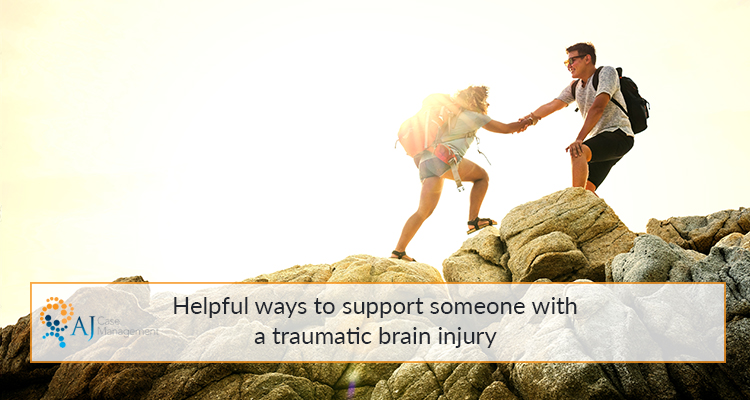We have created this guide for friends and family members of someone with a traumatic brain injury (TBI) so they can offer support through rehabilitation.
Seeing a loved one with a TBI can be upsetting and stressful, which is why we wanted to provide tips for helpful ways to offer your support.
From the early stages to their long-term recovery, find ideas and small gestures that can make a big difference. It may seem like an overwhelming journey that you don’t think you can contribute to, but there are plenty of ways to make a positive impact.
Navigate through our guide using the contents section:
- How case management can change their life.
- Does your friend have a traumatic brain injury?
- Offering support in the early stages.
- 8 tips for supporting their long-term recovery.
- How long will they need support for?
- How will a TBI affect a person? Adjusting to new changes…
- What not to say to someone with a TBI.
How referring a friend to case management for a traumatic brain injury can change their lives…
One of the best ways you can support a loved one struggling with a TBI is to refer them to a case manager.
A case manager offers thorough support throughout the journey to recovery, including emotionally, mentally and physically. They do this through a number of ways, some of which include:
- Various methods of therapy
- Counselling
- Assessing needs
- Planning solutions to issues before they happen
- Offering support to family members
- Co-ordinating with other facilities such as nursing homes and hospitals
- Offering support to manage personal responsibilities
If you are concerned about a friend or family and think they may be suffering with a brain injury, put them in touch with the right people and help them start their journey to recovery today.
Does your friend have a traumatic brain injury?
A traumatic brain injury is the specific term used for injuries sustained to the head as a result of a traumatic incident.
They can be mild, which damages the brain cells only temporarily. Or, they can be severe, which could include bleeding, bruising or other more serious damage.
Is a friend or family member showing any of these brain injury symptoms?
- Confusion and disorientation
- Nausea and vomiting
- Fits or seizures
- Difficulties with speech
- Problems with senses
- Memory loss
If someone you know is suffering with these symptoms after a head injury it is vital they get immediate medical attention.
How to support someone with a traumatic brain injury in the early stages
The early stages in the recovery of a brain injury are usually spent in hospital. This time may be spent diagnosing the injury, trying different treatments, measuring the severity of the injury and planning the best route to recovery.
This can be upsetting for friends and family to see a loved one in hospital. In these early stages, it is normal to feel anxious, confused, concerned or helpless.
As these types of injuries are so complicated, it will most likely be difficult to understand the injury and how you can directly help. However, there are many ways to offer support that will help recovery and your loved one will certainly appreciate.
Here are some useful tips from Headway:
Take each day as it comes. The symptoms of a TBI will fluctuate daily, so see how they are doing on the day and adjust your support around it.
Ask for help. Ask the medical staff if there is anything you can do to help. They will have some helpful suggestions for how you can support their recovery.
Try not to get frustrated. Although it can be a very upsetting time and you will have lots of questions, try not to take your frustrations out on others if you don’t get all the answers you are looking for.
The little things make a big difference. Even if you don’t think you’re making a difference by going in every day and simply talking to them, you are. Providing interest and stimulation is important in these early stages and a simple conversation can make someone’s day if they are confined to a hospital bed.
Ask if they would like their status being shared with friends. Some might not want their progress being shared with others. Or they may find it useful, so they don’t have to repeat themselves during various visits.
Bring in books, DVDs, magazines or games. This will help with stimulation and they might enjoy some variation in their daily routines.
8 tips for family and friends supporting someone with a traumatic brain injury in the long term
For some, returning home after a brain injury can be overwhelming, frightening, and draining. For others, it may be an exciting time that they want to celebrate. Everyone and every TBI is different, and there is no ‘normal’ way to recover.
No matter how your loved one is feeling, returning home is a big milestone that requires a lot of support. Here are some ways you can help create a smooth transition:
- Providing emotional support. Although you don’t want to push someone to talk about traumatic events or topics they don’t want to discuss, they will appreciate you listening to any thoughts or feelings they want to get off their chest.
- Providing practical support. This can be anything from helping with shopping trips to helping with household jobs.
- Learn about the brain injury. Although it is a complex subject, try learning about the injury and the symptoms it can cause. This can help you prepare for visits and adjust how you deliver the support.
- Don’t always ask. Sometimes it can be overwhelming for someone with a TBI to be continuously asked what they need. It is not always a straight forward question and they may not know what they need, just that they are struggling. Overcome this will small gestures such as visiting to cook them a meal or perhaps if they have children look after them for a few hours, so they can have a relaxing evening.
- Listen to them. It is important to not just brush over or ignore how they are feeling. If you are out of the house and they say they feel tired, then suggest taking them home. Another example would be if they say they don’t feel like talking today and want some alone time, don’t push them into social situations.
- Be patient. Try not to take offence if they cancel plans or don’t want to socialise as much as they did before the injury. Don’t take it to heart as they will have their own personal reasons, such as anxiety or fatigue.
- Learn to modify. A TBI doesn’t mean you have to stop enjoying your favourite activities with your friend, you may just have to do things a little differently. Think about what makes them anxious and how you can avoid it.
- Small gestures. There are plenty of little gestures that can make a big positive impact. From buying them flowers, to giving them a card when they have achieved something they are proud of, it is a kind gesture that they will appreciate.
Having a strong friendship through rehabilitation can make the world of difference to recovery. Although your friendship may present new challenges after a TBI, it is simply a matter of time before you both adjust to new circumstances and continue making fun and exciting memories together.
How long will a brain injury last and how long will they need support for?
As every brain injury is totally unique, rehabilitation is often unpredictable. This is why recovery plans are flexible and tailored throughout the rehabilitation process.
An injury to the brain is different from any other part of the body as the cells do not regenerate when they are damaged. However, it is still able to regain lost function and learn new things.
There may be a lot of inconsistency in the first few months of a TBI. The person with the injury is adjusting to this new aspect of their life and they can experience feelings of confusion, anxiety, frustration, a lack of focus or possibly aggression.
The fastest improvements take place in the first six months and will continue to do so for the next 2 years. Although improvements may slow down after 2 years, they don’t stop, and many people continue learning for the rest of their lives.
There is no set time frame for how long they will require support as it depends on the person and severity of the injury. Supporting someone with a TBI is all about learning as you go and taking things a day at a time.
How will a TBI affect a person? Adjusting to new changes…
There are many ways a person can be affected after acquiring a TBI, including:
- Physical affects
- Memory issues
- Imbalances with hormones
- Emotional affects
- Difficulty with communication
- Cognitive affects
Relationships and friendships are bound to be different after a severe brain injury, but that doesn’t equate to a lower quality relationship.
While adjusting to these new changes, it is important not to compare them to how they were before the injury. They are still the same person, but some characteristics may be exaggerated or intensified. As they get further through rehabilitation, they may start showing more of their pre-injury personality traits.
Things to avoid saying to someone with a traumatic brain injury
Although intentions may be good, there are some things that can cause upset when you are trying to make your friend feel better. Headway provides us with some examples of what to avoid:
“I’ve got a bad memory too!”
Casual forgetfulness is very different from an injury that prevents the brain from storing new or retrieving old memories.
“You don’t look disabled.”
This can be one of the most difficult aspects to deal with in everyday life for a person with a TBI. Their injury can’t be seen, so some assume they are exaggerating their symptoms or don’t believe them. The cognitive symptoms of an injury can last long after physical injuries have healed.
“Why are you in a bad mood?”
The emotional affects a person experiences after a TBI can sometimes be overwhelming and difficult to control. It is not a bad mood and asking this question will most likely make them feel worse.
“It could be worse…”
This can feel like their injury is being belittled or that they are overreacting. A TBI is life changing and shouldn’t be compared to anyone else’s injury.
“You could do it yesterday, what’s changed?”
The type and severity of symptoms fluctuate on a daily basis. There are many ups and downs throughout rehabilitation and this is completely normal. Understanding this will help you not make the person feel bad about their progress.
“I wish I didn’t have to go to work.”
Although this might seem like a light-hearted statement, it can be insulting and upsetting. Some people with brain injuries aren’t able to go to work because of intense pain, fatigue, anxiety or other reasons.


